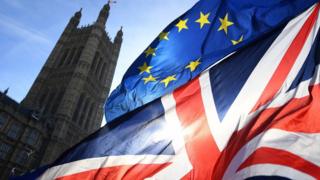Brexit: Only 'one train of thought in DUP' to oppose NI Protocol

There is "only one train of thought" in the DUP when it comes to opposing the NI Protocol in the Brexit deal, a senior party MP has said.
Sir Jeffrey Donaldson made the comments after the government said it would it bring new legislation on customs rules in NI this week.
DUP leader Arlene Foster previously told Sky News she had to recognise the Protocol "is the reality now".
The party rejected the deal and the NI Protocol when it was agreed last year.
On Tuesday, the next round of talks between the UK and EU to reach a trade deal begins in London.
The government will publish the Internal Market Bill on Wednesday, which it says is designed to be a safety net in case the negotiations fail.
The announcement has led to concerns from some of the Stormont parties and the EU that Number 10 would not deliver on commitments about Northern Ireland in the withdrawal agreement.
But the government said the legislation would only result in "minor clarifications" and it was committed to the earlier deal.
Unionist parties in Northern Ireland are strongly opposed to the plan for Northern Ireland in the Brexit deal, fearing it damages the UK union.
Speaking on BBC's Good Morning Ulster programme, Sir Jeffrey accused the EU of "not acting in good faith".
The party's Westminster leader said the DUP had been working with the government "for some time" about addressing elements of the NI Protocol it believes could damage the economy in NI.
"We hope this bill will address key issues presenting a real challenge for business in Northern Ireland, if the EU were to have its way," he said.
The party issued an official statement on Monday night, almost 24 hours after the initial development first emerged.
The party is "still arguing that in these negotiations the Withdrawal Agreement must be scrapped or changed to take account of the need to protect Northern Ireland's place in the internal market of the United Kingdom", the statement said.
That differs from comments Mrs Foster made on Sky News at the weekend, where she said her party opposed the NI Protocol and the deal, but that it was now "law".
"Boris Johnson is prime minister, he took it to the Commons, he gained the support he needed, and therefore it became law," she said.
"I mean, there are some who would continue to fight against the Protocol, I have to recognise that that is the reality now."
Asked if Mrs Foster had a different view on the NI Protocol than other members in the DUP, Sir Jeffrey replied: "No, there's only one train of thought in the DUP and that's reflected in the statement last night agreed by the party leader and leadership team more generally.
"Arlene was very clear - we have and continue to oppose elements of the NI Protocol that would require a customs border in the Irish Sea."
What is the Northern Ireland Protocol?
The Northern Ireland part of the Brexit deal, known as the Protocol, was agreed in October last year and is due to come into effect at the end of this year.
It is designed to prevent a hard border in Ireland - or even any new checks at the Irish border.
It does this by effectively keeping Northern Ireland in the EU's single market for goods.
This will mean products entering Northern Ireland from the rest of the UK will be subject to new checks and control - the so-called Irish Sea border.
However, the precise nature of these checks needs to be agreed by the EU and UK and are being negotiated in parallel with the trade talks.
It will also mean when relevant EU laws are amended or new ones are drawn up, they will also apply in Northern Ireland.
Under the plan, Northern Ireland would leave the EU customs union with the rest of the UK at the end of this year, but would continue to enforce the EU's customs code at its ports.
Details on the nature and extent of goods checks at Northern Ireland ports are still to be agreed, ahead of the transition period ending on 31 December.
The NI Assembly is due to hold a further debate on Brexit and Shadow Secretary of State for NI, Labour's Louise Haigh, will raise it during an urgent question in the Commons later on Tuesday.
Speaking on BBC Radio Foyle, Ms Haigh said she wanted an explanation as to why the government was bringing the legislation "at such a late stage in proceedings".
"This is a deal that Boris Johnson presented to the British people in a general election as oven-ready and now a year later it is still not implemented," she said.
"I think there is discomfort among Conservatives today, a lot of them will not sit comfortably with breaching their international treaty obligations nor will they sit comfortably with the way the government are treating Northern Ireland as a political football or an afterthought at best."
Although the UK formally left the EU in January, it has continued to follow rules set in Brussels during a transition period - which ends on 31 December - while discussions over a long-term trade agreement continue.
The trade talks are aimed at securing a deal to allow companies to trade without taxes or customs checks.
But Mr Johnson is expected to tell EU leaders it must be agreed in time for the European Council meeting on 15 October, if it is to be in force by 1 January.